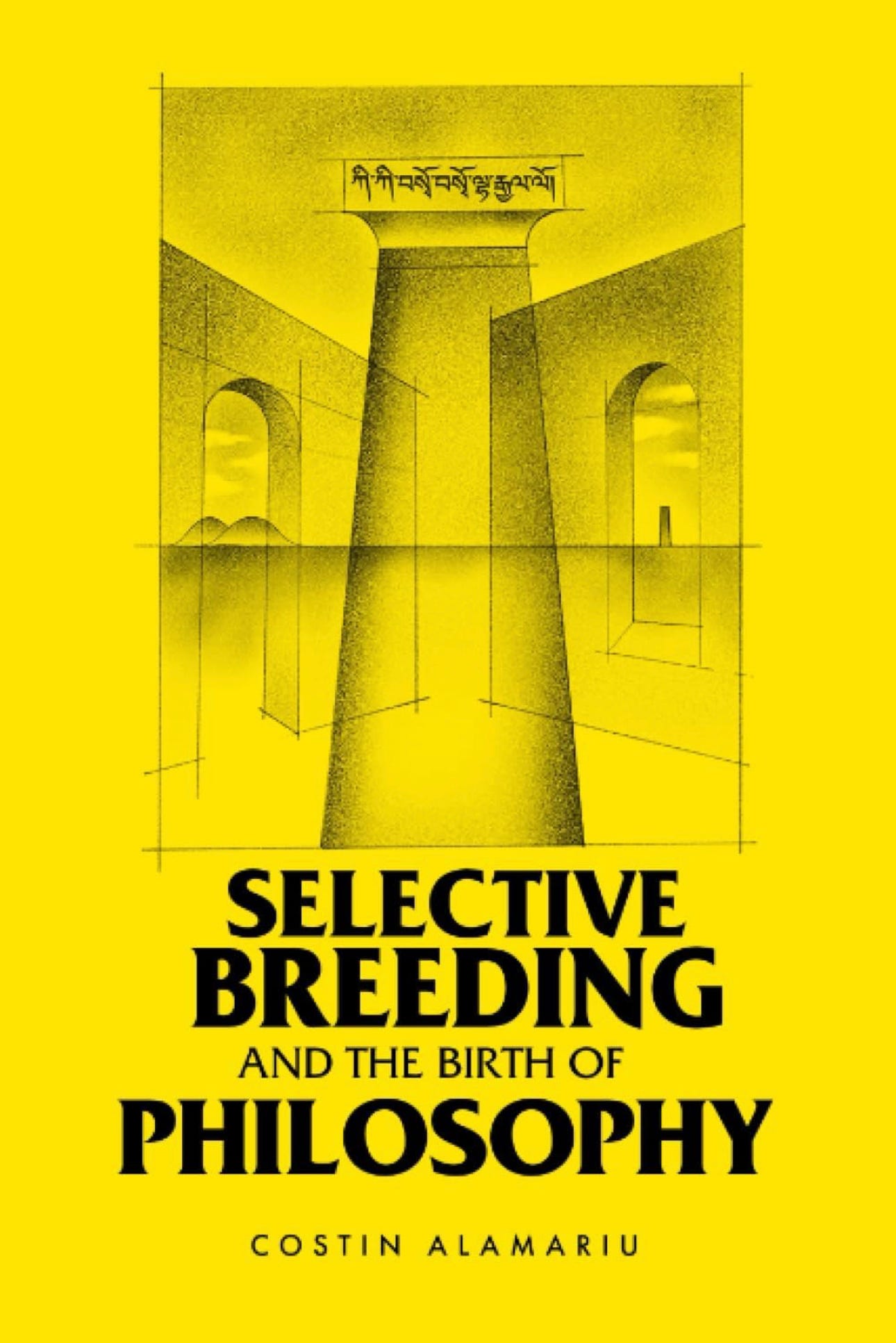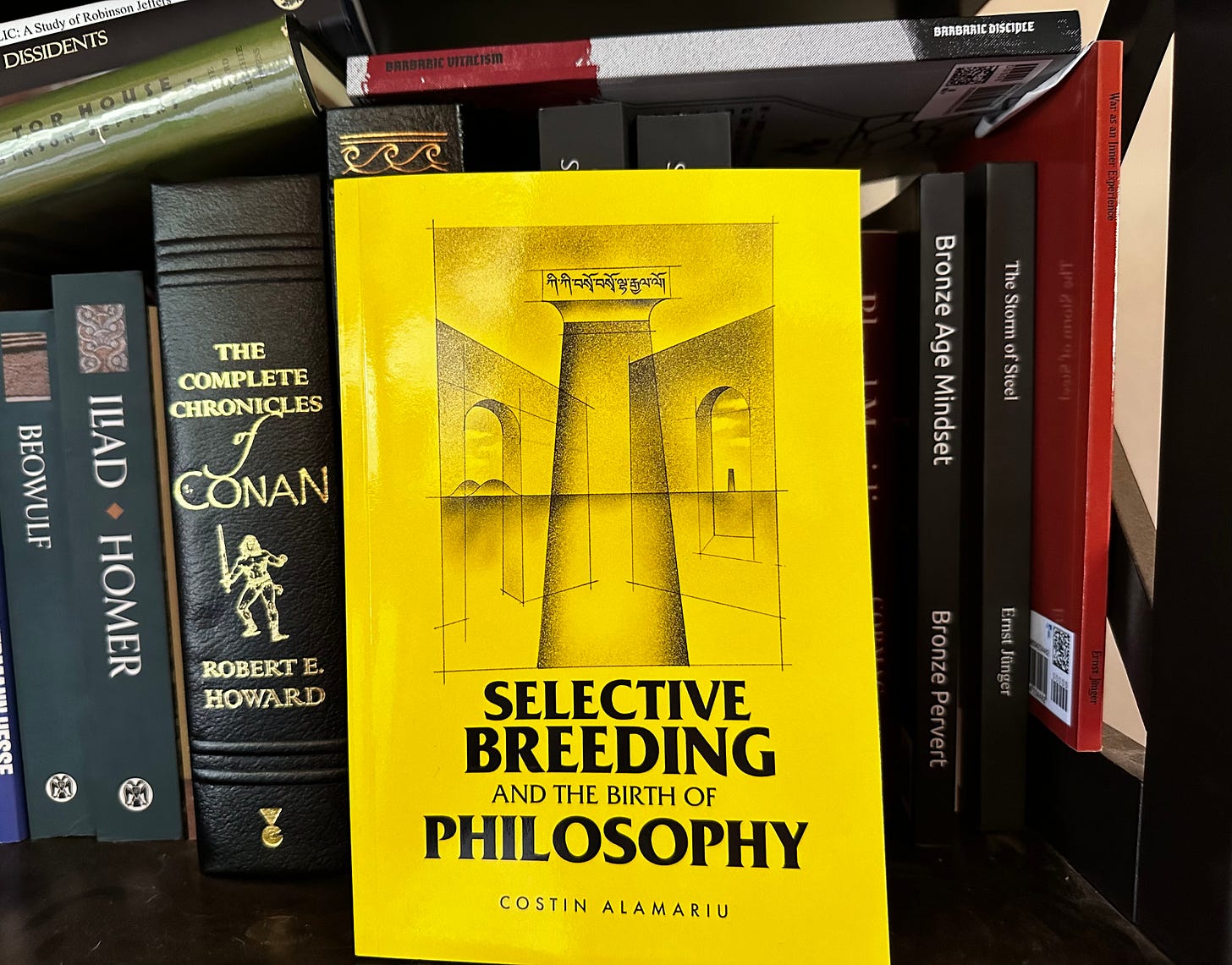Selective Breeding and the Birth of Philosophy by Costin Alamariu
It’s not very often that I read a book that captivated me. This one I can say I read through as fast as I could as responsibilities allowed. You can say I felt similar to Nietzsche when he first read Schopenhauer. This book is the dissertation of one Costin Alamariu, but don’t be turned off by the idea that it’s a “dissertation.” It’s a book that explains the thesis of Alamariu: that the discrimination and slander against the philosophers which culminated in the execution of Socrates was WARRANTED. What?! There had been the argument on part of the Grek polis that the philosophers were really wannabe TYRANTS and one of them, Critias — a student of Socrates — actually tried to become one.
Socrates, in turn, was executed for his part in teaching this Critias, one of the thirty tyrants. Critias is a figure who became the Grek Hitlor. There was a consorted effort for every one of the time to denounce him and make the point that they were not him, that they were repudiated by him. Among this group is PLATO, who to avoid persecution while also preserving philosophy, writes in such a manner as to show that Socrates was not about tyranny. Rather, he cared about justice. About what was right by the polis, by nomos. This you can say was an act, a ploy, to save philosophy and everything Socrates taught.
I don’t know how many of you are versed in philosophy. You end up taking at least a class on it during your public education and college. For me, philosophy was very enjoyable and I took as many classes on it as I could with it not being my major. Now, my self-education after the fact has undoubtedly been SUPERIOR to anything I learned in school, but I will give you breakdown about how modern “philosophers” talk about philosophy. Philosophy is seen as a “way of life.” A search for the truth. It is about how one should live his life or how a society should be organized. From here on after Plato, you get all the leftist thinkers who get stuffed in.
The ancient philosophers did see philosophy as a way of life, but NOT in the way modern intellectuals do. The ancient Greks themselves saw philosophers as tyrants. They were criminals, traitors to the polis even. Why? They saw the philosophers as trying to overthrow the NOMOS of the polis. What is nomos? Nomos is understood today as the law of the polis, but it means so much more.
Nomos is better translated to mean CONVENTION. Yes, there were laws and these laws were so important, Greks were made to recite them as songs in their youth so they could never be forgotten and never be changed. The nomos was the rule of the ancestors. It was the collective purpose of the people. It was their laws, customs, and culture all wound up into this word nomos. The problem with this, which must be explained since I talk about the importance of ancestor worship often on RESAVAGER, is the polis began to degrade. If you are not familiar with Oswald Spengler, the Grek culture was entering its winter.
“To maintain the heroic posture for centuries on end is beyond the power of any people.” -Oswald Spengler
The conquering aristocracy found itself degrading and merging with their slave population. The Grek aristocrats were trying to figure out how to hold onto their power. How could they maintain the wild and heroic nature of their ancestors? In Spenglarian terms, they were living in the past. Coping that they weren’t the men their ancestors were. How could they recapture the power and vitality of their great ancestors? This was the mission of the philosopher.
Selective Breeding and the Birth of Philosophy offers a Nietzschean interpretation of the ancient Grek world, as well as, the true meaning of being a philosopher.
Costin Alamariu gives an account of the ancient Greks that you won’t get from academia and that will give it both credibility and authority. He pulls from a multitude of sources from Pindar and Plato to Burckhardt, Strauss, and Nietzsche. Selective Breeding offers many passages affirming the thesis of Alamariu, as well as, a theory on how philosophy came about. The book is separated into four main parts. The introduction gives the reasoning behind the thesis. The first part of the book describes the ancient Greks, how the Greks saw the world around them, and introduces the reader to the concept of nomos. The second part focuses on Pindar and how the Greks discovered the concept of nature, which was hidden from them because of nomos. It also delves into how the aristocrat came about and how the aristocrat was necessary for the invention of philosophy. The third part zeroes in on Plato and the secret meanings of his philosophy. The final part is how Nietzsche revived the true spirit of the philosopher by uncovering the true meaning of Plato and what was forgotten by the Christians.
This book is very powerful and gives a game-changing account of nature. There are many things in this book that would make the modern intellectual shudder. To be so naive to believe the Greks didn’t care about eugenics and what it took to be what they saw as wellborn. Noble born. What you get in public education is fantastical view of ancient Grek life. Completely ignored is the concept of nomos and the effect it had on the ancient Greks. Coulanges in his The Ancient City touches on this, but not on the dark side of nomos and the rule of the ancestral which Alamariu exposed as nothing but debauchcracy. Sorry, I mean democracy, democratic rule. Rule by the old.
Perhaps, my favorite part of book is Alamariu’s writing on the aristocratic regime and how it came about. Especially, his discussion on Chiron, the half-man, half-beast teacher of many Greks including ACHILLES. The ancient Grek aristocracy understood the importance of knowing how to survive and thrive in nature. That nature itself was something beyond even the divine and to continue their conquering ways, they had to sharpen that wild instinct in their own. On top of this, thanks to their pastoral beginnings, they knew they had to breed the right qualities into their descendants.
This book is very powerful, you must read. The purpose of this book is to zero in on the battle of the last couple thousand years, that hasn’t gone away. The battle between nomos and nature. Democratic rule versus the rule of the best. I will say this book has given me many questions I must answer and highly recommend you check it out. I leave you now with a description of the conflict between Agamemnon and Achilles who Alamariu says is one of the first instances of this battle appearing in the ancient world:
“Indeed, it has been speculated that the initial quarrel between Achilles and Agamemnon is a quarrel between nature and convention in embryo, so to speak. Agamemnon holds the royal scepter, indicating conventional and ancestral title to rule; but in challenging him Achilles, recognized by all to be the stronger and more excellent hero, swears an oath on a scepter of nature, a sprouting tree branch—this is incidentally the second and only instance of a word with the same root as phusis in the whole of Homer..” -Costin Alamariu




I also thought the inclusion of Chiron was a powerful symbol